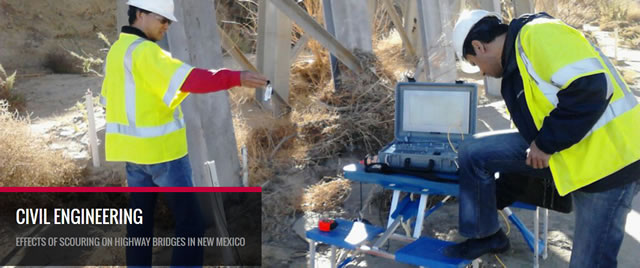
Civil Engineering ETDs
Publication Date
9-3-2013
Abstract
Vegetation in the floodplain plays an important role in dictating the hydraulics of an open channel river system. While vegetation is beneficial to the biological productivity of the river system, it can also increase flood risk due to increased channel roughness. Traditional means of predicting flow hydraulics involve applying a constant roughness value, while neglecting change in roughness due to flow characteristics and variation of vegetation parameters. The objective of this research was to develop and demonstrate techniques to hydraulically model an open channel river system while taking into account dynamic roughness due to vegetation. The Sedimentation and River Hydraulics in Two-Dimensions (SRH-2D) model was enhanced to use measured vegetation parameters to calculate dynamic Mannings n values, referred to as effective n (ne) values, while simulating the hydraulics of the system. Two approaches based on work by Järvelä (2004) and Baptist et al. (2007) were implemented into SRH-2D for roughness computations. Field and modeling work focused on a section of a restoration area along the San Joaquin River near Fresno, California. Both approaches were modeled at four different channel discharges: 31.2, 70.8, 113.3, and 212.4 m3/s. A sensitivity analysis was also performed for both approaches at 113.3 m3/s for parameters of uncertainty. A wide range of calculated ne values showed that roughness is dependent on velocity and flow depth. Both approaches underpredicted water surface elevation when compared to calibrated models. The difference in water surface elevations between the calibrated models and the roughness models varied with channel discharge, with both approaches performing equally. Both approaches overpredicted velocity in a similar fashion. The sensitivity analysis proved that both techniques are altered by their uncertain parameters. Further research of the uncertain parameters would increase the accuracy of the models and lead to a better understanding of dynamic roughness.'
Keywords
Frictional resistance (Hydrodynamics)--Measurement, Channels (Hydraulic engineering), Riparian plants--Environmental aspects
Sponsors
United States Bureau of Reclamation
Document Type
Thesis
Language
English
Degree Name
Civil Engineering
Level of Degree
Masters
Department Name
Civil Engineering
First Committee Member (Chair)
Stone, Mark
Second Committee Member
Coonrod, Julie
Third Committee Member
Howe, Kerry
Recommended Citation
Gillihan, Tyler. "Dynamic vegetation Roughness in the riparian zone." (2013). https://digitalrepository.unm.edu/ce_etds/82
